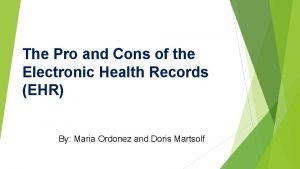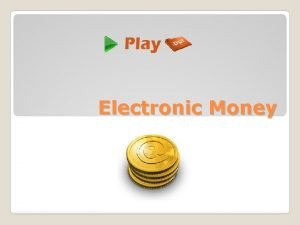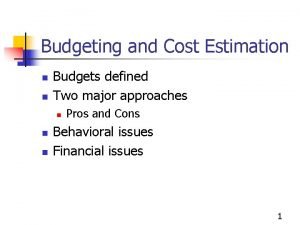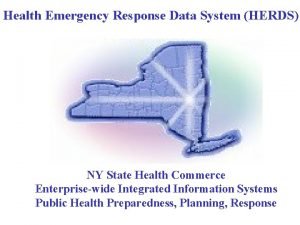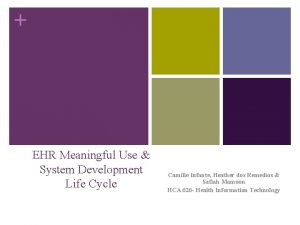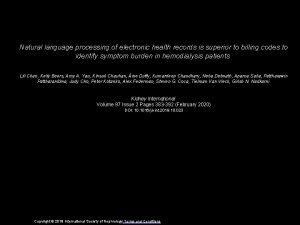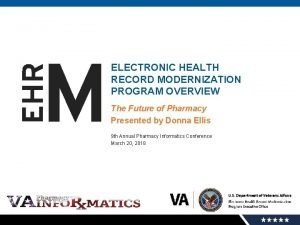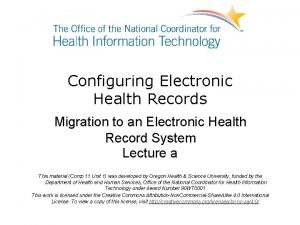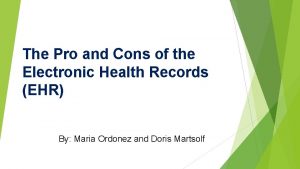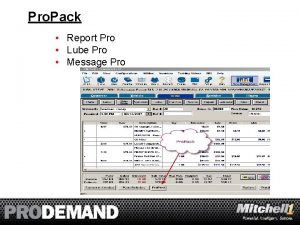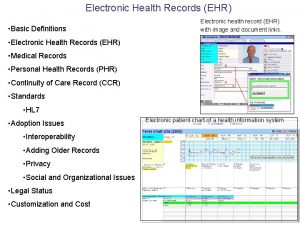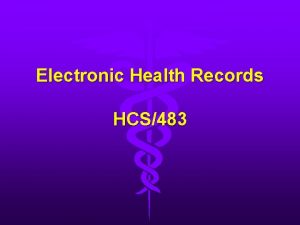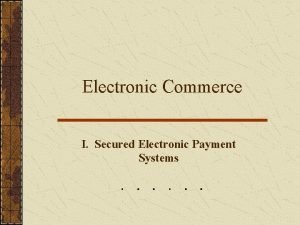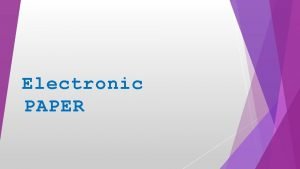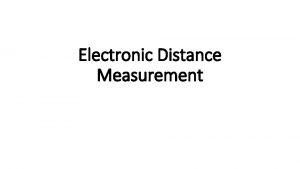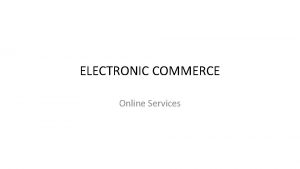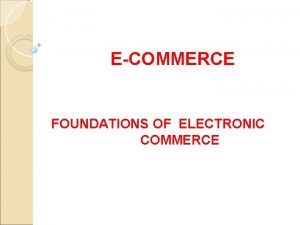The Pro and Cons of the Electronic Health














- Slides: 14

The Pro and Cons of the Electronic Health Records (EHR) By: Maria Ordonez and Doris Martsolf

Electronic Health Records (EHR) EHR is also known as Electronic Medical Records (EMR). It allows health care providers to record a client’s information on a computer, tablet, or any other device. The American Recovery and Reinvestment Act 2009 led to a financial incentive for health care facilities to help clients stay informed about their health. This technology is beneficial because it provides instant access to a client’s clinical history. However, it also creates concerns about privacy violations.

Electronic Health Records (EHR)

The benefits of Electronic health records (EHR) A better quality of care, communication, and safety between clients and health care providers leads to a improved outcome. In January 2004, President George W. Bush stated, “By computerizing health records we can avoid dangerous medical mistakes, reduce cost, and Improve care. ”

The benefits of Electronic health records (EHR) Con’t. The computerized provider order entry (CPOE) of an electronic system provides licensed health care providers the opportunity to enter medication orders into state medical records as well as local and professional guide lines. Hospitals that are using EHR reported better communication among healthcare providers, especially during a patient’s transfer from one facility to another and in case of emergency.

The benefits of Electronic health records (EHR) Con’t. Surveillance and monitoring disease conditions are enhanced. For example, in ambulatory care, it improved the management of cardiac risk factors and made access to the monitors of glucose levels of diabetic patients easier.

The benefits of Electronic health records (EHR) Con’t. https: //youtu. be/a 3 ZB 5 -Jsh_c

Downsides of Electronic Health Records (EHR) Security concern: Electronic health records contain the personal data of clients, and creates an opportunity for medical Identity theft. EHR can lead to a violation of a client’s privacy health records (HIPAA) because it provides easy access to the confidential information of clients for unauthorized individuals that have access to it.

Downsides of Electronic Health Records (EHR) Con’t. EHR can easily lead to shortcuts in order to avoid a work overflow for physicians. This can result in wrong treatments from a previous condition. Risky behaviors, such as copying and pasting, pulling notes forward, and leaving pasted information unaltered, can lead to misinterpretation of the patient’s condition.

Downsides of Electronic Health Records (EHR) Con’t. Devices of small storage may lead to the skipping of important clinical information, resulting in an error diagnosis. The use of computers inhibits face-to-face interactions between clients and providers because there is no eye contact during the health assessment.

Downsides of Electronic Health Records (EHR) Con’t. In the future, EHR will diminish the way physicians treat their client’s social and emotional needs. It will take away the healing process and the caring model that the health care system is based on. https: //www. youtube. com/watch? v=Om. X- N 4_Ks 2 U

Downsides of Electronic Health Records (EHR) Con’t.

Summary EHR has become a very important part of technology and will prove vital in shaping the future of the healthcare system. In an ideal world, all nurses will have a basic competency knowledge of nursing informatics, and they will be able to shape the future. (TIGER) Technology Informatics Guidance Education Reform determined the use of informatics was a core competency skill for all health care providers.

Reference page August; 2013(8), T. H. , & Author(s): Carol Pohlig, BSN, RN, CPC Acs. Pohlig, C. (2017, February 08). The Pros and Cons of Electronic Health Records. Retrieved June 21, 2017, from http: //www. thehospitalist. org/hospitalist/article/125690/health-policy/pros-and-conselectronic-health-records Andrews, M. (2016, August 25). Pros and Cons of Electronic Health Records. Retrieved June 21, 2017, from http: //www. consumerreports. org/medicalidentity-theft/pros-and-cons-of-electronic-health-records/ Mc. Gonigle, D. , & Mastrian, K. (2018). Nursing Informatics and the Foundation of Knowledge (Fourth ed. ). Burlington, MA: Jones & Bartlett Learning, LLC. Ventres, W. (2013, October 10). Electronic Health Records: Upsides, Downsides, and Inside-Outsides on the Way Toward Their Use in Clinical Practice. Retrieved June 21, 2017, from http: //www. tandfonline. com/doi/full/10. 1080/10401334. 2013. 827982? scr oll=top&need. Access=true
 Electronic health records pros and cons
Electronic health records pros and cons Positives and negatives of fossil fuels
Positives and negatives of fossil fuels Pros and cons of animal testing
Pros and cons of animal testing Geothermal pro and cons
Geothermal pro and cons Disadvantages of consensus communication
Disadvantages of consensus communication Electronic field production
Electronic field production Is the electronic exchange of money or scrip
Is the electronic exchange of money or scrip The macro pro pro maxcharltonmacrumors
The macro pro pro maxcharltonmacrumors Personal health budgets pros and cons
Personal health budgets pros and cons Herds reporting
Herds reporting System development life cycle of electronic health records
System development life cycle of electronic health records Electronic health records
Electronic health records Natural language generation for electronic health records
Natural language generation for electronic health records Electronic health record modernization services
Electronic health record modernization services +electronic +health +records +migration
+electronic +health +records +migration
